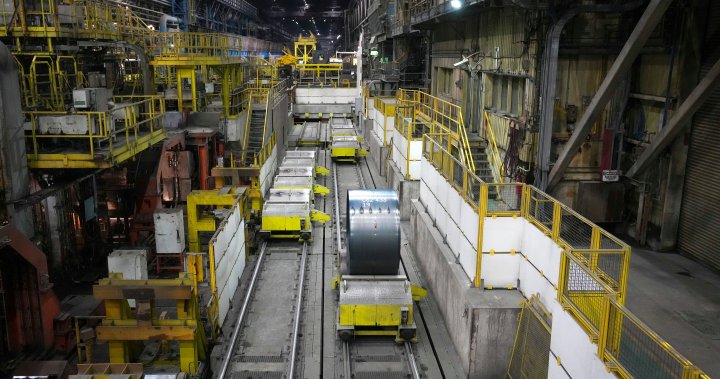Canada
Canadian industry braces for Trump’s promised tariffs on steel, aluminum

Steel and Aluminum Industry Braces for Trump’s Tariffs: A Growing Concern for Canada
Introduction: The Looming Threat of Tariffs
Steel and aluminum industry groups in Canada are once again bracing for the threat of tariffs from U.S. President Donald Trump. In a press conference aboard Air Force One while traveling to New Orleans for the Super Bowl, Trump announced that he would formally declare 25% tariffs on all steel and aluminum imports, including those from Canada and Mexico. This move has sparked deep concern among Canadian industry leaders, who are wary of the potential economic impact and disruptions this could cause. The Canadian Steel Producers Association has expressed its apprehensions, stating that while the details of the tariffs remain unclear, they will closely analyze the President’s order once it is released. Catherine Cobden, president and CEO of the Canadian Steel Producers Association, emphasized that the last time Trump imposed tariffs on Canada in 2018, it caused significant harm to both the U.S. and Canada.
Historical Context: A Repeat of Past Disruptions
This is not the first time Trump has targeted Canada’s steel and aluminum sectors. In March 2018, during his first term, Trump imposed tariffs of 25% on steel and 10% on aluminum, citing national security concerns. Canada was initially exempt from these tariffs, but the exemption was revoked on May 31, 2018, leading to a trade dispute. The $20 billion worth of steel trade between the two countries highlights the deep integration of the U.S. and Canadian economies, making any disruptions particularly detrimental to both nations. The tariffs caused massive disruptions and harm on both sides of the border, ultimately leading to retaliatory measures from Canada.
Industry Response: Concerns and Consequences
The Canadian Steel Producers Association has expressed its concerns about the latest threat of tariffs. Catherine Cobden noted that the last round of tariffs in 2018 caused significant disruptions, and there is a fear that history might repeat itself. The association has stated that it will closely monitor the situation and analyze the President’s order once it is released. The potential impact of these tariffs extends beyond the steel and aluminum industries, as they could affect downstream industries that rely on these materials, leading to job losses and economic instability. The association is urging both governments to consider the long-term consequences of such tariffs and work towards a resolution that benefits both countries.
Economic Impact: A Threat to Integrated Trade
The steel and aluminum trade between Canada and the U.S. is worth $20 billion annually, a testament to the integrated nature of the two economies. Any tariffs imposed on these products could disrupt supply chains, increase costs for manufacturers, and ultimately lead to higher prices for consumers. The Canadian Steel Producers Association has highlighted the importance of maintaining a seamless trade relationship, as any disruptions could have far-reaching consequences. The tariffs could also lead to a decline in production, as manufacturers struggle to absorb the additional costs, potentially leading to layoffs and a slowdown in economic growth.
Retaliation and Resolution: A Historical Precedent
When Trump imposed tariffs on Canadian steel and aluminum in 2018, Canada responded with counter-tariffs on American products, including Florida orange juice. This retaliatory measure was intended to push the U.S. to reconsider its tariffs and find a mutually beneficial solution. Nearly a year later, on May 17, 2019, the White House announced that a deal had been reached to prevent “surges” in steel and aluminum supplies from Canada and Mexico, effectively ending the trade dispute. This historical precedent suggests that while the initial imposition of tariffs causes significant disruption, a resolution is possible through negotiation and cooperation.
The Road Ahead: Uncertainty and Potential Consequences
As the Canadian steel and aluminum industries await the formal announcement of the tariffs, there is a sense of uncertainty about the future. The potential impact of these tariffs on the industry, the broader economy, and Canada-U.S. trade relations is significant. Catherine Cobden and the Canadian Steel Producers Association have urged both governments to carefully consider the long-term consequences of these tariffs and work towards a solution that maintains the integrity of the integrated economies. The coming days will be crucial in determining whether the two nations can navigate this challenge without causing lasting damage to their trade relationship.











